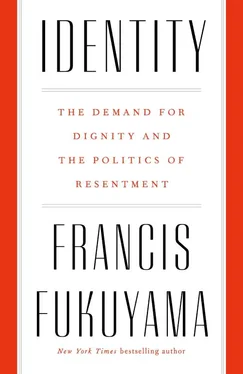Robert H. Schuller, Self-Esteem: The New Reformation (Waco, TX: Waco Books, 1982). Schuller’s books fall in a longer American tradition of self-help literature by authors such as Norman Vincent Peale. See for example Schuller’s Success Is Never Ending, Failure Is Never Final: How to Achieve Lasting Success Even in the Most Difficult Times (New York: Bantam Books, 1990).
Bob DeWaay, Redefining Christianity: Understanding the Purpose Driven Movement (Springfield, MO: 21st Century Press, 2006).
Andrew J. Polsky, The Rise of the Therapeutic State (Princeton, NJ: Princeton University Press, 1991), 158–64.
Ibid., 199–200.
Quoted in Herbert Lindenberger, “On the Sacrality of Reading Lists: The Western Culture Debate at Stanford University,” in The History in Literature: On Value, Genre, Institutions (New York: Columbia University Press, 1990), 151.
The overall trend of universities undertaking a therapeutic mission is described in Frank Furedi, “The Therapeutic University,” American Interest 13 (1) (2017): 55–62.
Donald Horowitz, Ethnic Groups in Conflict (Berkeley: University of California Press, 1985), 141–43.
Ta-Nehisi Coates, Between the World and Me (New York: Spiegel and Grau, 2015), 7–10.
Simone de Beauvoir, The Second Sex (New York: Alfred A. Knopf, 1953).
Stuart Jeffries, “Are Women Human?” (interview with Catharine MacKinnon), Guardian , April 12, 2006.
See Jacob Hoerger, “Lived Experience vs. Experience,” Medium , October 24, 2016, https://medium.com/@jacobhoerger/lived-experience-vs-experience-2e467b6c2229.
These points are all made in Hoerger, ibid.
Kimberlé Williams Crenshaw, “Mapping the Margins: Intersectionality, Identity Politics, and Violence Against Women of Color,” Stanford Law Review 43:1241–99, July 1991.
Mathieu Bock-Côté, Le multiculturalisme comme religion politique (Paris: Les Éditions du Cerf, 2016), 16–19.
Sasha Polakow-Suransky, Go Back to Where You Came From: The Backlash Against Immigration and the Fate of Western Democracy (New York: Nation Books, 2017), 23–24.
Theo Lochocki, “Germany’s Left Is Committing Suicide by Identity Politics,” Foreign Policy , January 23, 2018.
Maximillian Alvarez, “Cogito Zero Sum,” Baffler , August 2, 2017, https://thebaffler.com/the-poverty-of-theory/cogito-zero-sum-alvarez.
An example of this is the treatment of Rebecca Tuvel for her article “In Defense of Transracialism,” published in Hypatia: A Journal of Feminist Philosophy , as described by Kelly Oliver in “If This is Feminism…,” Philosophical Salon , May 8, 2017, http://thephilosophicalsalon.com/if-this-is-feminism-its-been-hijacked-by-the-thought-police/. See also Kelly Oliver, “Education in an Age of Outrage,” New York Times , October 16, 2017.
Mark Lilla, The Once and Future Liberal: After Identity Politics (New York: HarperCollins, 2017).
Thomas E. Mann and Norman J. Ornstein, It’s Even Worse Than It Looks: How the American Constitutional System Collided with the New Politics of Extremism (New York: Basic Books, 2012).
Cultural appropriation refers to the efforts of someone of one race, ethnicity, or gender to make use of or profit from the culture of another group. In one notable case, a painting by artist Dana Schutz of Emmett Till’s mutilated corpse led to demands that the painting be destroyed on the grounds that she was a white painter depicting a moment traumatic for black people. In another case an editor was forced to step down from his position at the Canadian Writers Union for a piece defending the right of white authors to create characters from minority or indigenous backgrounds. In both cases the individuals being criticized were themselves liberals trying their best to sympathetically understand the experiences and sufferings of people from minority backgrounds.
The text of Hannah Black’s letter criticizing Dana Schutz is given at https://i-d.vice.com/en_uk/article/d3p84a/black-artists-urge-the-whitney-biennial-to-remove-painting-of-murdered-black-teenager-emmett-till. See also Kenan Malik, “In Defense of Cultural Appropriation,” New York Times , June 14, 2017; Lionel Shriver, “Lionel Shriver’s Full Speech: ‘I Hope the Concept of Cultural Appropriation Is a Passing Fad,’” Guardian , September 13, 2016.
Matthew Taylor, “‘White Europe’: 60,000 Nationalists March on Poland’s Independence Day,” Guardian , November 12, 2017; Anne Applebaum, “Why Neo-Fascists Are Making a Shocking Surge in Poland,” Washington Post , November 13, 2017.
See Michela Wrong, It’s Our Turn to Eat: The Story of a Kenyan Whistle-Blower (New York: HarperPerennial, 2010). See also Fukuyama, Political Order and Political Decay , 330–32.
Rogers M. Smith, Political Peoplehood: The Roles of Values, Interests, and Identities (Chicago: University of Chicago Press, 2015).
For a poignant account of both the richness of pre–World War I Vienna and the tragedy of its collapse, see Stefan Zweig, The World of Yesterday (Lincoln: University of Nebraska Press, 2013).
In the wake of President Trump’s embrace of Vladimir Putin, a surprising number of Republicans have developed a favorable view of Russia, with a certain fringe asserting that they would trust Putin more than their fellow Americans who were liberal. Paul Reynolds, a Republican National Committee member from Alabama, was quoted as saying, “If I’ve got a choice of putting my welfare into the hands of Putin or the Washington Post , Putin wins every time.” James Hohmann, “The Daily 202: As Roy Moore Declines to Step Aside, a Tale of Two Republican Parties Emerges,” Washington Post , November 10, 2017; Zack Beauchamp, “Roy Moore Admires Vladimir Putin’s Morality,” Vox , December 8, 2017.
The rapidly developing states of East Asia had problems with corruption, but at levels generally lower than in other parts of the world. The elite focus on national development made possible the “developmental state” in countries such as Japan, South Korea, Singapore, and China. While such states have been said to exist in African countries such as Rwanda or Ethiopia, or in Chile under the Pinochet dictatorship, these have tended to be the exception rather than the rule. See Stephan Haggard, Developmental States (New York: Cambridge University Press, 2018).
See Francis Fukuyama, Trust: The Social Virtues and the Creation of Prosperity (New York: Free Press, 1995).
Ibid.; Robert D. Putnam, Bowling Alone: The Collapse and Revival of American Community (New York: Simon and Schuster, 2000).
Читать дальше












